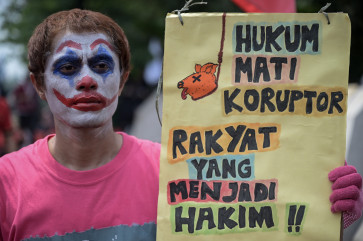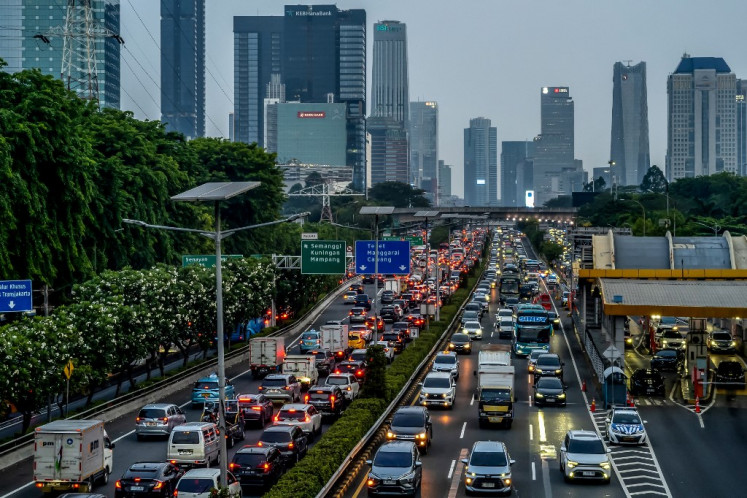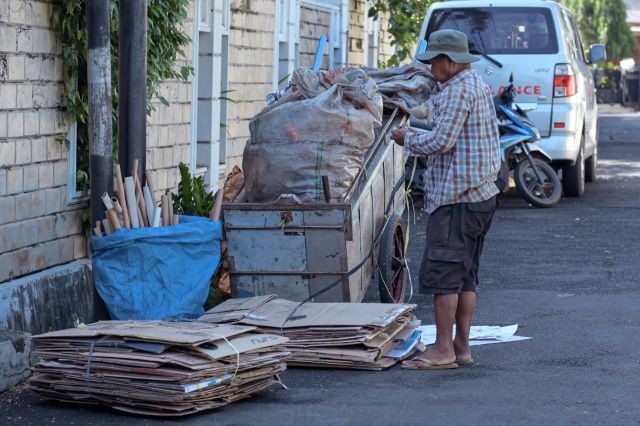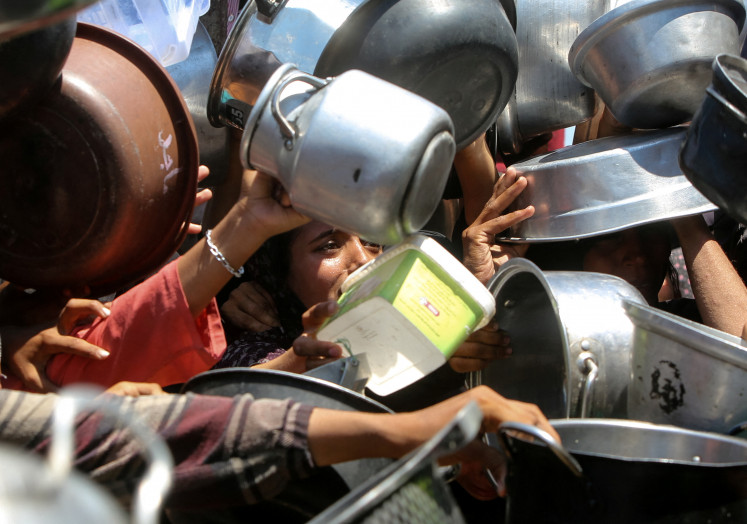Popular Reads
Top Results
Can't find what you're looking for?
View all search resultsPopular Reads
Top Results
Can't find what you're looking for?
View all search resultsCOP26 summit and Indonesia’s regional climate leadership
Indonesia has successfully reduced its annual deforestation rate by 75 percent (Halimatudsadiah, et al. 2021).
Change text size
Gift Premium Articles
to Anyone
T
his week, beginning on Sunday, the United Kingdom hosts the 26th UN Climate Change Conference of Parties (COP26) in Glasgow. The summit gathers the leaders of governments, businesses and civil society to undertake, hopefully, significant and bold action to keep our planet from climate catastrophe. The report by the Intergovernmental Panel on Climate Change is very clear – that without any action, we are on course to increase the global surface temperature by more than 2 degrees C above pre-industrial levels.
The climate science shows very clearly that such an increase in the global temperature, despite looking small, would lead to extreme weather, rising sea levels and would displace populations at an unprecedented scale. In Indonesia, rising sea levels and floods have been one of the biggest threats to major cities on the coast. Our high exposure to climate change shows that the efforts and expenses needed to deal with such catastrophes could outstrip the costs of averting such a calamitous outcome.
The COP26 summit in Glasgow is critical in that context. For Indonesia, the Glasgow meeting provides a strategic venue for voicing and showing commitment and progress in reducing carbon emissions. It is also an opportunity for Indonesia to play a leading role in climate action.
Indonesia has successfully reduced its annual deforestation rate by 75 percent (Halimatudsadiah, et al. 2021). With land-use activities contributing more than half of greenhouse gas (GHG) emissions, lowering deforestation rates at significant levels means that we are on the track to tackle emissions. Indeed, the progress offers lessons for other countries. But discussion of Indonesia’s success seems to be muted internationally.
Indonesia has also been relatively successful in turning the corner on the COVID-19 virus despite experiencing chaotic situations in the early days of the pandemic and during the Delta variant explosion. While there should be no room for complacency, Indonesia’s approach deserves recognition globally. Known for its geographic challenges, the country has successfully coordinated health resources across its regions (World Bank 2021). Relatively fast vaccination rates were made possible by global cooperation.
Related to climate action, we may note that such success in balancing health and the economy could serve as an impetus for promoting a greener recovery as well. And we have resources to go into that direction. Indonesia is among countries with the largest rainforest areas, a significant source of biodiversity and carbon absorption. It also has the second-longest coastline and is an archipelagic country that should be able to tap into economic opportunities from the marine economy.
As the largest economy in the Southeast Asia, Indonesia should play a leadership role in climate action. We should voice the importance of global cooperation in reducing the climate change. Indonesia, as a developing country, should ask the richest countries for evidence that they will help developing countries meet the cost of addressing the visible impacts of climate change. A recent row in the REDD+ agreement between Indonesia and Norway could put dent on global cooperation in fighting climate change. But this also means that Indonesia is capable of reducing emissions independently. This could be an example for other developing countries too.
It is important to note, however, that leadership abroad should be a reflection of concrete action at home. Despite making progress in commitments, we still have a long to-do list. It is not about the absence of a climate policy. Instead, it’s that we do not have coordinated policies yet.
For example, the National Action Plan for Reducing Greenhouse Gas Emissions (RAN-GRK) targeted a 26 percent reduction in GHG emissions in the 2010–2020 period. We have also already set a Nationally Determined Contribution (NDC) in which we plan to reduce GHG emissions 29 percent by 2030 compared to business as usual (BAU). But there is still a lack of clarity on how we will achieve the target, not to mention that some observers have said the target itself is incompatible with the target in the Paris Agreement. Another report reveals that Indonesia may have missed its commitment to changing its energy mix, given that renewable energy accounted for 9.15 percent of the total energy mix in 2019.
Meanwhile authorities in the financial sector – another front line for fighting climate change – also set ambitious goals. The Financial Services Authority (OJK) released two sequential road maps on sustainable finance requiring companies and financial institutions to regularly report their sustainability commitments. But this is not enough. The progress of financial institutions in environmental issues should be accompanied by other sectors, such as agriculture, forestry, electricity and construction.
So what should we do at home? First of all, we need concerted policies that integrate all climate action initiatives across different ministries. Targets and implementable actions should be communicated clearly to all stakeholders in order to provide clarity and avoid confusion.
On the energy side, phasing out coal, as many have proposed, would be a major step in the energy transition pathway. Yet the energy crisis in Europe and China remind us to take a long route by maintaining non-coal but low-emission fossil fuels in the energy mix, such as gas, before completely moving to renewable sources. Another silver lining of the crisis is that we instead may invest heavily in research and development on energy sources that are abundant in Indonesia, such as geothermal energy.
Political support for greener growth will be needed. A recent survey of young voters by Indikator Politik Indonesia suggests that the majority of young people are concerned about climate change. As we have seen elsewhere, voices for green action are entering the political mainstream. However, it is important to highlight that shifting to sustainable production and consumption would affect the livelihoods of communities. Thus, the transition has to take into account the potential losses of communities whose livelihoods may be most affected.
Stronger global cooperation in mobilizing international financing is critical, and Indonesia, as a representative of developing countries, should voice this concern in the forum. Indonesia itself needs around US$247.2 billion from 2018 to 2030 to achieve its NDC by 2030 (The Second Biennial Update Report (BUR) 2018). Without global financial support, Indonesia’s target will be achieved at a slower pace. It is essential that the Glasgow agreement cover support from rich countries. It is also a just approach, considering the past emissions of developed countries and their current high emissions per person.
All in all, Indonesia should show its leadership in the region in regard to climate action. COVID-19 has provided an opportunity to redirect our development toward a more sustainable path. In addition, recent investment commitments on electric vehicle battery production provide a chance for the country to be integrated into the global supply chain of sustainable technology. And with concerted efforts from all parties, we could tap wider benefits from more sustainable development.
---
Head of the Mandiri Institute










